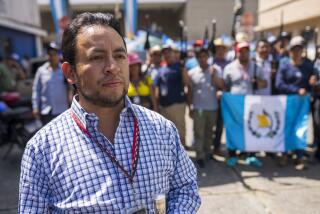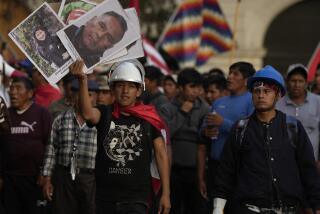Nepal on brink of change
- Share via
KIRTIPUR, NEPAL -- — The police who once hunted him as a guerrilla leader now guard him as a political candidate. He urges his radical young followers to act more like Gandhi and less like the gun-toting rebels many of them were.
Prachanda, Nepal’s revered and reviled Maoist supremo, is trying hard to convince his fellow Nepalese, and the rest of the world, that he is committed to revolution through the ballot box, not the barrel of a gun.
Across this dirt-poor Himalayan nation, millions of voters are expected to go to the polls Thursday in an election whose outcome will demonstrate, in large measure, whether they believe his promises -- and, in turn, whether he keeps them.
He insists he will. The brutal, decade-long “People’s War” waged by communist insurgents in which more than 13,000 died is a thing of the past, says Prachanda, the nom de guerre of Pushpa Kamal Dahal. Democracy and peaceful collaboration are the order of the day.
“Let there be no doubt,” he declared in an interview after a recent election rally in this Maoist stronghold outside Katmandu, the capital. “We will not break the peace process even [if] we are in the minority. But we believe we will be in the majority.”
Plenty of Nepalese view such pledges with mistrust, especially when the former guerrilla follows them with accusations of a conspiracy to undermine his party. Some of his deputies warn of a backlash if their party loses.
The balloting has already been postponed twice, partly because of alleged violations of the peace process by Maoist cadres.
Security for the election remains a serious concern: Several small bombs exploded in Katmandu over the weekend, and there have been numerous cases of campaign violence, including the reported fatal shooting of a communist candidate Tuesday in western Nepal.
Many analysts think the former rebel group will finish last out of the three main parties, though none of the formations will own an outright majority. Official results may not be known for up to three weeks.
Regardless of the outcome, the election is likely to change this backward country of 28 million people forever.
The 601 seats up for grabs are for a constituent assembly that will draw up a new constitution. Most of the assembly will be elected, but a few members will be appointed. Women, those of low caste and the long-oppressed people from the southern plains are among those angling for a say in how to reinvent their country.
Reshaped discourse
It is a mark of how profoundly the Maoists have reshaped the political discourse here that the assembly’s first order of business, by consent of all the major parties, will be to address the Maoists’ most cherished dream: abolition of the monarchy.
Nepal has been a unified Hindu kingdom for 239 years, under the reign of monarchs believed to be earthly incarnations of the god Vishnu. But a disastrous, 15-month period of absolute rule by King Gyanendra, which ended in April 2006 after a popular revolt, has turned him into a figure of widespread odium. Onetime royalists have become fervent republicans.
“The monarchy has a long history,” said Prakash Man Singh, a former government minister and an assembly candidate from the country’s biggest and oldest party, the Nepali Congress. “But since the king couldn’t abide by the constitutional-monarchy principle, and since the monarchy has been a destabilizing factor in Nepal, all the people have come to the conclusion that the monarchy should come to an end.”
The three major parties promise to declare Nepal a republic. Over the last two years, the interim government has stripped Gyanendra of power, scrubbed his portrait from the currency, subjected him to taxes and excised the word “royal” from the army and the national airline. He rarely appears in public anymore.
For the Maoists, it is sweet revenge. The king zealously prosecuted the war against them, relying on a security apparatus that was accused by human rights groups of committing atrocities every bit as bloody as the Maoists’ own record of killings, kidnappings, torture and intimidation.
“If he respects the will of the masses, he can live as a common citizen,” Prachanda said, his forehead caked with red powder and paste, a sign of blessing, that dusted his glasses. “If not, the masses will [oppose] him and the people will put him on trial.”
Yet booting Gyanendra, who ascended to the throne after a mysterious palace massacre in 2001 that killed his reigning brother and several other members of the royal family, may be easier said than done.
No one can predict what kind of powers will be invested in the prime minister, or whether the framers of the new constitution will even stick with a parliamentary system. Also, pockets of royalist sentiment still exist.
“Think of a tape recorder,” political analyst Hari Sharma said.
“The monarchy is a defunct tape that’s not working, but it’s stuck inside. It’s not functioning, it’s not giving music, but the new system will not give us any new music until we eject it.”
The Maoists propose a presidential system. At Prachanda’s rallies, which resemble country jamborees complete with folk singers and comedians, supporters introduce the candidate as “our future president.” That prospect, however distant, makes many of his compatriots shudder.
Cartoon of ‘Gandhi’
They doubt his, and his movement’s, conversion to democratic politics. After his exhortation to his followers to act like Gandhi, a newspaper cartoonist drew Prachanda barelegged and in sandals, but with a policeman’s bamboo bludgeon in hand instead of Gandhi’s trademark walking stick.
Prachanda’s second in command recently compared rival politicians to “monkeys” and warned that the Maoists would seize power “within 10 minutes” if the polls were rigged against them. And cadres in the countryside have sown fear among uneducated villagers by claiming to have special binoculars that will allow them to see into the polling booth.
“If the Maoists lose, it means the election has been rigged,” said supporter Surpana Surkheti, 18, at a Prachanda rally in Katmandu. But she quickly added: “The Maoists shouldn’t take up arms. . . . They should come out into the streets to demand a free and fair election.”
Sharma said the fiery language of some Maoist leaders was calibrated to mollify rank-and-file members who might have felt sold out by the leadership when Prachanda agreed to lay down arms in November 2006. But the leaders know that “if they go back to guns and the jungles, whatever they’ve achieved will be wiped out.”
In his speeches, Prachanda still rails against “feudal” and “regressive” forces. He promises equitable development in a land that has grown dependent on foreign aid and tourism earnings from the blissed-out backpackers and trekkers who throng Katmandu’s narrow alleyways.
The Maoists’ call for justice for marginalized groups has also led other parties to push such issues more strongly, another sign of how the Maoist agenda has gone mainstream.
But other parties do not harbor illusions about the challenge of working with the former guerrillas.
“We will have to tame a wild elephant,” said Singh, the Nepali Congress candidate. “It will take some time.”
--
More to Read
Sign up for Essential California
The most important California stories and recommendations in your inbox every morning.
You may occasionally receive promotional content from the Los Angeles Times.











